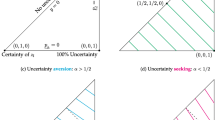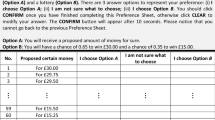Abstract
Subjects are randomization-loving if they prefer random mixtures of two bets to each of the involved bets. Various approaches appeal to such preferences in order to explain uncertainty aversion. We examine the relationship between uncertainty and randomization attitude experimentally. Our data suggest that they are not negatively associated: most uncertainty-averse subjects are randomization-neutral rather than loving. Surprisingly, a non-negligible number of uncertainty-averse subjects even seems to dislike randomization.
Similar content being viewed by others
References
Anscombe F.J., Aumann R.J.: A definition of subjective probability. Ann Math Stat 34(1), 105–199 (1963)
Becker G.M., DeGroot M.H., Marschak J.: Measuring utility by a single-response sequential method. Behav Sci 9(3), 226–232 (1964)
Camerer C., Weber M.: Recent developments in modelling preferences: uncertainty and umbiguity. J Risk Uncertain 5(4), 325–370 (1992)
Cettolin, E., Riedl, A.: Changing ambiguity attitudes and a preference for indifference. Unpublished manuscript, Maastricht University (2008)
Chew S.H., Sagi J.S.: Small worlds: modeling attitudes toward sources of uncertainty. J Econ Theory 139(1), 1–24 (2008)
Dittmann I., Kübler D., Maug E., Mechtenberg L.: Why votes have a value, discussion paper 68, department of economics. Humboldt University, Berlin (2008)
Dow J., Werlang S.R.D.C.: Nash equilibrium under knightian uncertainty: breaking down backward induction. J Econ Theory 64(2), 305–324 (1994)
Eichberger J., Kelsey D.: Uncertainty aversion and preference for randomisation. J Econ Theory 71(1), 31–43 (1996)
Eichberger J., Kelsey D.: Non-additive beliefs and strategic equilibria. Games Econ Behav 30(2), 183–215 (2000)
Eichberger, J., Kelsey, D.: Are the treasures of game theory ambiguous? Econ Theory (forthcoming)
Ellsberg D.: Risk, ambiguity, and the savage axioms. Q J Econ 75(4), 643–669 (1961)
Ellsberg, D.: Risk, ambiguity and decision. Ph.D. thesis, Harvard University, Published in 2001. New York: Routledge (1962)
Epstein L.G.: A definition of uncertainty aversion. Rev Econ Stud 66(3), 579–608 (1999)
Epstein, L.G.: Three paradoxes for the ‘Smooth Ambiguity’ Model of Preference. Econometrica (forthcoming)
Fischbacher U.: Zurich toolbox for research in economic experiments. Exp Econ 10(2), 171–178 (2007)
Ghirardato P.: On independence for non-additive measures with fubini theorem. J Econ Theory 73(2), 261–291 (1997)
Ghirardato P., Marinacci M.: Ambiguity made precise: a comperative foundation. J Econ Theory 102(2), 251–289 (2002)
Ghirardato, P., Siniscalchi, M.: A more robust definition of multiple priors. Unpublished manuscript, Northwestern University (2010)
Gilboa I.: Expected utility with purely subjective non-additive probabilities. J Math Econ 16(1), 65–88 (1987)
Gilboa I., Schmeidler D.: Maximin expected utility with non-unique prior. J Math Econ 18(2), 141–153 (1989)
Halevy Y.: Ellsberg revisited: an experimental study. Econometrica 75(2), 503–536 (2007)
Hey J.D., Lotito G., Maffioletti A.: The descriptive and predictive adequacy of theories of decision making under uncertainty/ambiguity, discussion papers 08/04 department of economics. University of York, York (2008)
Holt C.A.: Preference reversals and the independence axiom. Am Econ Rev 76(3), 15–508 (1986)
Holt C.A., Laury S.K.: Risk aversion and incentive effects. Am Econ Rev 92(5), 1644–1655 (2002)
Karni E., Safra Z.: ‘Preference Reversal’ and the observability of preferences by experimental methods. Econometrica 55(3), 85–675 (1987)
Keren, G., Teigen, K.H.: Decisions by coin toss and the limits of rationality. Unpublished manuscript, Tilburg Institute for Behavioral Economics Research (2008)
Klibanoff, P.: Uncertainty, decisions and normal form games. Unpublished manuscript, Kellog Graduate School of Economics, Northwestern University, Chicago (1996)
Klibanoff P.: Stochastically independent randomization and uncertainty aversion. Econ Theory 18(3), 605–620 (2001)
Klibanoff P., Marinacci M., Mukerji S.: A smooth model of decision making under ambiguity. Econometrica 73(6), 1849–1892 (2005)
Klibanoff, P., Marinacci, M., Mukerji, S.: On the smooth ambiguity model: a reply. Working paper, Department of Economics, University of Oxford (2009)
Lo K.C.: Equlibrium in beliefs under uncertainty. J Econ Theory 71(2), 443–484 (1996)
Maccheroni F., Marinacci M., Rustichini A.: Ambiguity aversion, robustness, and the variational representation of preferences. Econometrica 74 (6): 1447–1498 (2006)
Machina M.J.: ‘Expected Utility/Subjective Probability’ analysis without the sure-thing principle or probabilistic sophistication. Econ Theory 26(1), 1–62 (2005)
Machina, M.J.: Event-separability in the Ellsberg Urn. Econ Theory (forthcoming)
Machina M.J., Schmeidler D.: A more robust definition of subjective probability. Econometrica 60(4), 80–745 (1992)
Marinacci M.: Ambiguous games. Games Econ Behav 31(2), 191–219 (2000)
Raiffa H.: Risk, ambiguity, and the savage axioms: comment. Q J Econ 75(4), 690–694 (1961)
Saito K.: Preference for randomization: ambiguity aversion and inequality aversion, discussion paper 1489, center for mathematical studies in economics and management science. Northwestern University, Chicago (2010)
Sarin R.K., Wakker P.: A simple axiomatization of nonadditive expected utility. Econometrica 60(6), 1255–1272 (1992)
Savage L.J.: The Foundation of Statistics. Wiley, New York (1954)
Schmeidler D.: Subjective probability and expected utility without additivity. Econometrica 57(3), 571–587 (1989)
Segal U.: Does the preference reversal phenomenon necessarily contradict the independence axiom?. Am Econ Rev 78(1), 36–233 (1988)
Siniscalchi M.: Vector expected utility and attitudes toward variation. Econometrica 77(3), 801–855 (2008)
Trautmann S.T., Vieider F.M., Wakker P.P.: Preference reversals for ambiguity aversion, tilburg institute for behavioral economics research. Tilburg University, Tilburg (2009)
Wakker P.: Testing and characterizing properties of nonadditive measures through violations of the sure-thing principle. Econometrica 69(4), 1039–1059 (2001)
Author information
Authors and Affiliations
Corresponding author
Additional information
The paper benefited from the contributions of participants of the 2009 Asia Pacific Meeting of the Economic Science Association, the 2009 Maastricht Behavioral and Experimental Economics Symposium, the 2010 Workshop on Risk, Ambiguity, and Decisions in honor of Daniel Ellsberg, and at a seminar in 2010 at the Groupe d’Analyse et de Théorie Economique (GATE) in Lyon.
The authors wish to thank Jürgen Eichberger, Simon Grant, David Kelsey, Jean-Philippe Lefort, Jörg Oechssler, Arno Riedl, Jacob Sagi, and David Schmeidler for their valuable comments. Financial support from the Deutsche Forschungsgemeinschaft (SFB 504) is gratefully acknowledged.
Rights and permissions
About this article
Cite this article
Dominiak, A., Schnedler, W. Attitudes toward uncertainty and randomization: an experimental study. Econ Theory 48, 289–312 (2011). https://doi.org/10.1007/s00199-011-0649-z
Received:
Accepted:
Published:
Issue Date:
DOI: https://doi.org/10.1007/s00199-011-0649-z




